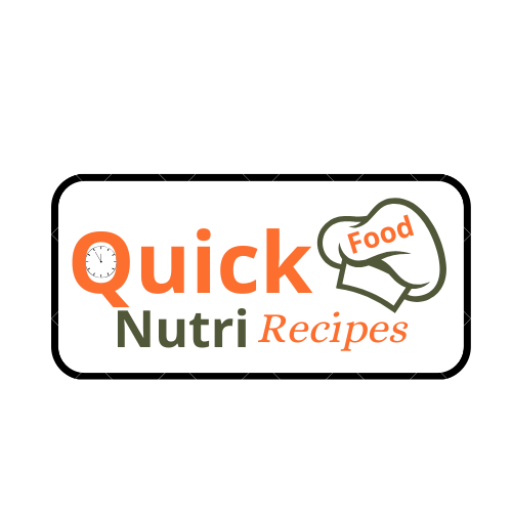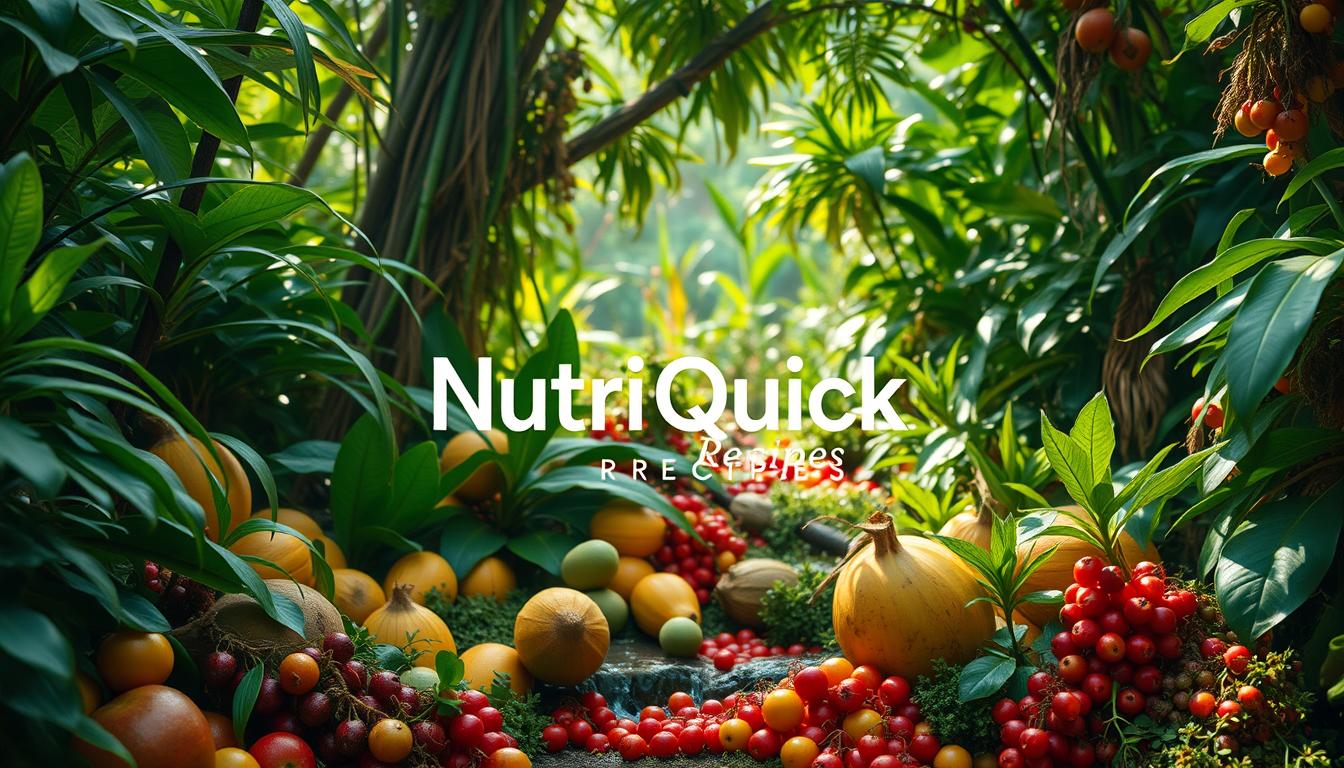Charles Darwin once said, “It is not the strongest of the species that survives, nor the most intelligent, but the most adaptable to change.” This quote is very relevant to jungle survival nutrition. It shows how important it is to be adaptable to survive and thrive in the wilderness. I’m excited to share my insights on jungle survival nutrition, wilderness nutrition, and outdoor food planning1.
Exploring jungle survival nutrition reminds me of the need for a healthy diet in the jungle. With the right mindset and skills, you can face the challenges of finding and preparing nutritious food. This article is all about the importance of jungle survival nutrition, wilderness nutrition, and outdoor food planning1.
Key Takeaways
- Understanding the basics of jungle survival nutrition is crucial for staying alive in the wilderness
- Wilderness nutrition requires adaptability and creativity in finding and preparing food
- Outdoor food planning is essential for a successful jungle survival experience
- Jungle survival nutrition involves more than just finding food, it’s also about staying hydrated and healthy
- With the right knowledge and skills, anyone can thrive in the jungle
Understanding the Basics of Jungle Survival Nutrition
Surviving in the jungle means having the right survival diet tips. It’s not just about finding food. It’s about eating right to stay alive and healthy. A good diet is key to surviving in the wild.
In the jungle, eating in the wild means knowing your environment and what your body needs. You must learn to identify edible plants, hunt and prepare animals, and purify water. These survival diet tips help you survive and stay healthy.
- Identifying edible plants and avoiding toxic ones
- Hunting and preparing animals in a safe and sustainable way
- Purifying water to avoid waterborne illnesses
Remember these tips and watch your nutrition. As says, a good diet is crucial for survival. By following thesesurvival diet tips, you boost your chances of survival.
Importance of Proper Nutrition in Survival
Proper nutrition is vital for jungle survival. It gives you the energy and nutrients your body needs. Without it, you can get weak and sick easily. By following these survival diet tips, you can stay healthy and boost your survival chances.
Essential Nutrients for Jungle Survival
To survive in the jungle, it’s key to eat foods rich in nutrients. As I explore the wild, I seek out foods packed with essential nutrients. Research shows2 that sloths eat tough leaves from trees. These leaves give them the energy they need to survive.
In the jungle, I look for foods high in proteins, carbs, and fats. These nutrients are crucial for energy and health. For instance, insects are a great protein source. Fruits and vegetables are full of carbs. I also eat nuts and seeds for healthy fats.
Here are some key nutrients for jungle survival:
- Proteins: building blocks of survival
- Carbohydrates: quick energy sources
- Fats: long-lasting energy reserves
As I explore, I aim for a balanced diet with these nutrients. This helps me stay healthy and energized2. With the right foods, I can thrive in this tough environment.
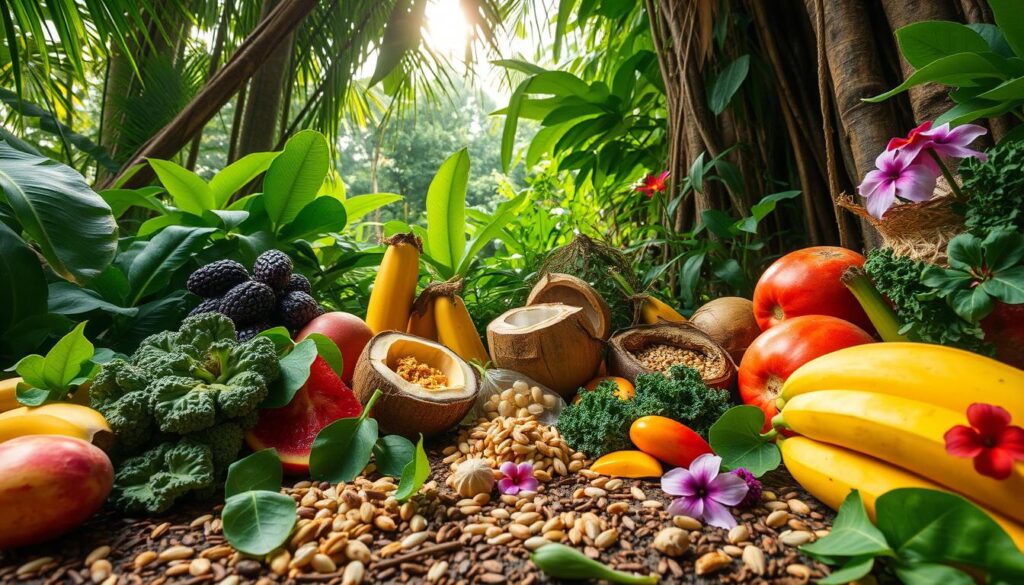
Understanding the importance of nutrients helps me make better food choices. With this knowledge, I can enjoy the jungle’s beauty while staying safe and healthy2.
Identifying Edible Plants in the Jungle
Foraging for food in the wild is exciting but requires knowledge. Knowing which plants are safe to eat is crucial. In the jungle, I look for berries, wild greens, and roots3. But, I must be careful to avoid toxic plants.
Some plants, like maple leaves, are full of vitamins and minerals3. They are great for a wilderness diet. Yet, it’s important to know the difference between safe and toxic plants. For example, English yew and horse chestnut leaves are toxic3.
To have a safe and fun foraging experience, learning about edible plants is key. We can enjoy eating in the wild and understand the value of wilderness nutrition4.
| Plant | Edible Parts | Preparation |
|---|---|---|
| Maple Leaves | Leaves | Raw or cooked |
| Wild Berries | Fruits | Raw |
| Wild Greens | Leaves | Raw or cooked |
By following these tips and staying alert, we can safely enjoy foraging. This way, we can appreciate the thrill of finding food in the wild while keeping our health in mind3.
Foraging for Protein Sources
Surviving in the jungle means knowing how to find food. Insects are a great source of protein and are everywhere in the jungle5. Crickets and mealworms are easy to catch and full of nutrients.
Fishing is another key way to get protein. With simple gear, you can catch fish and have a lot of protein5. Hunting small game like rabbits and squirrels also provides protein and can be done sustainably.
Planning your food is key in the jungle. Eating insects, fish, and small game keeps your diet balanced and nutritious. Cole Sturgis from “Life Below Zero” says knowing how to survive is crucial5.
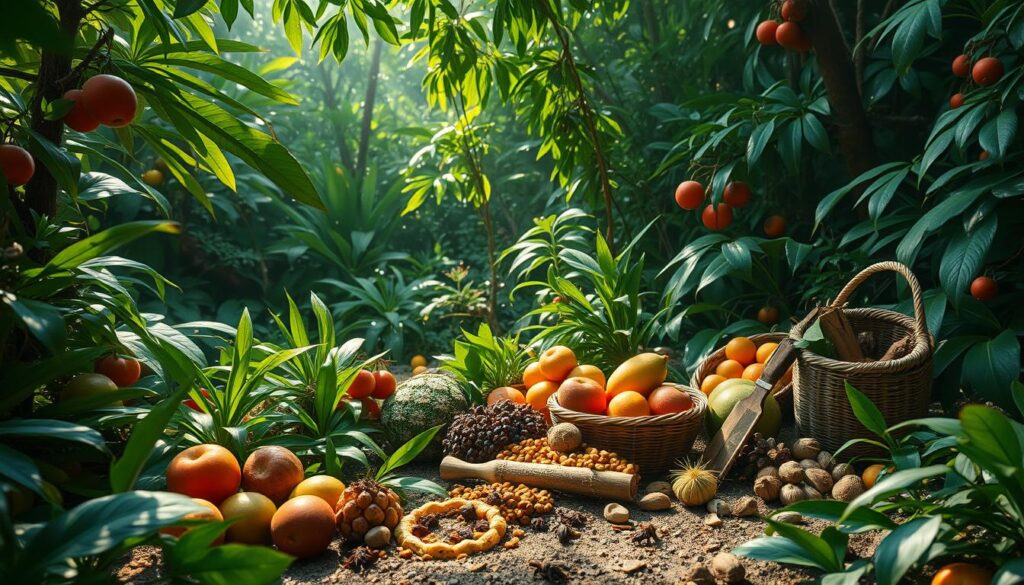
Follow these tips to stay healthy in the jungle. Always hunt sustainably and respect nature to keep food coming5.
Staying Hydrated in the Jungle
Staying hydrated is key for survival in the wilderness. When I plan my outdoor food, finding fresh water is my top priority. Clean drinking water is as important as food in the jungle. It’s vital to know how to purify water to avoid getting sick6.
To keep hydrated, I drink lots of water all day. Finding clean water can be tough, but there are ways to purify it. You can boil it, filter it, or use tablets4. It’s also crucial to save water in emergency situations.
Here are some tips for staying hydrated in the jungle:
- Drink plenty of water throughout the day
- Find fresh water sources, such as streams or rivers
- Purify water using boiling, filtering, or water purification tablets
- Ration water and conserve it in survival situations
By following these tips, I can stay hydrated and survive in the jungle6.
Preparing and Cooking Food Safely
When it comes to jungle survival nutrition, preparing and cooking food safely is crucial. In the world of wilderness nutrition, it’s not just about finding edible plants. It’s also about handling and cooking them safely. According to, proper food handling and cooking techniques can prevent foodborne illnesses.
In the wild, basic cooking techniques like boiling, roasting, and grilling are used. It’s important to build a safe and efficient cooking fire. Use dry wood and keep a bucket of water nearby. When cooking, keep raw and cooked food separate and wash hands often. As suggests, using a water filter or purification tablets can ensure safe drinking water.
Basic Cooking Techniques
- Boiling: brings water to a rolling boil to kill bacteria and other microorganisms
- Roasting: cooks food over an open flame, using a spit or skewers
- Grilling: cooks food directly over an open flame, using a grill or grill pan
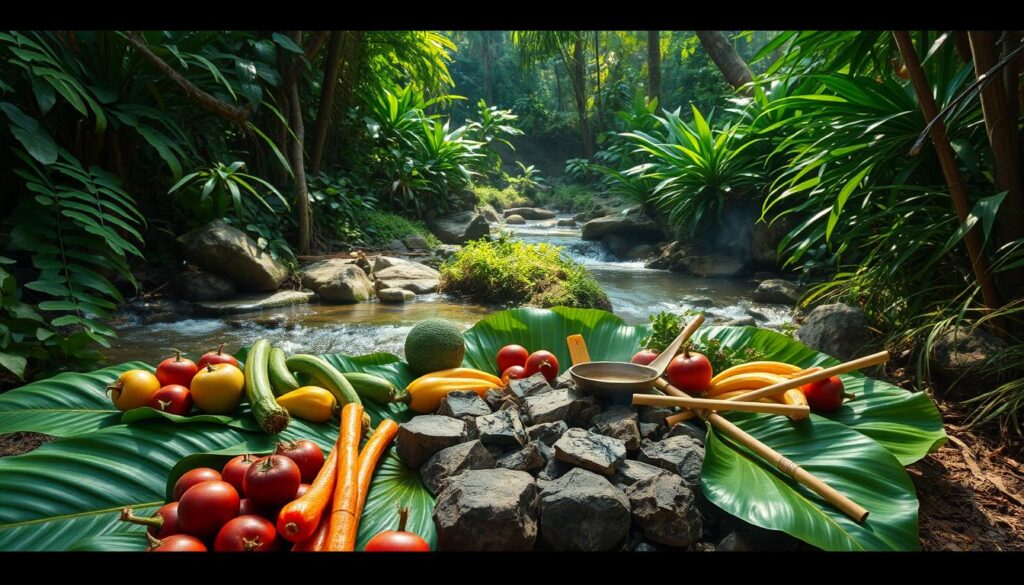
Avoiding Contamination
To avoid contamination, handle food safely. Keep raw and cooked food separate, and wash hands often. By following these simple tips, you can enjoy safe and nutritious meals in the wild. This makes the most of your jungle survival nutrition and wilderness nutrition experience, while also considering outdoor food planning.
Planning Your Jungle Food Supply
Planning your food supply is key in the jungle. Foraging and eating wild can be tough, but with a good plan, you can meet your nutritional needs. It’s important to avoid overhunting and overforaging7. You should know which plants are safe to eat, how to hunt and prepare meat, and use resources wisely.
A good food plan is vital in a survival situation. Think about what resources you have and what you need to eat. Start by finding out what food is easy to find, like fruits, nuts, and fish. Then, plan how to get and prepare these foods for a steady supply8.
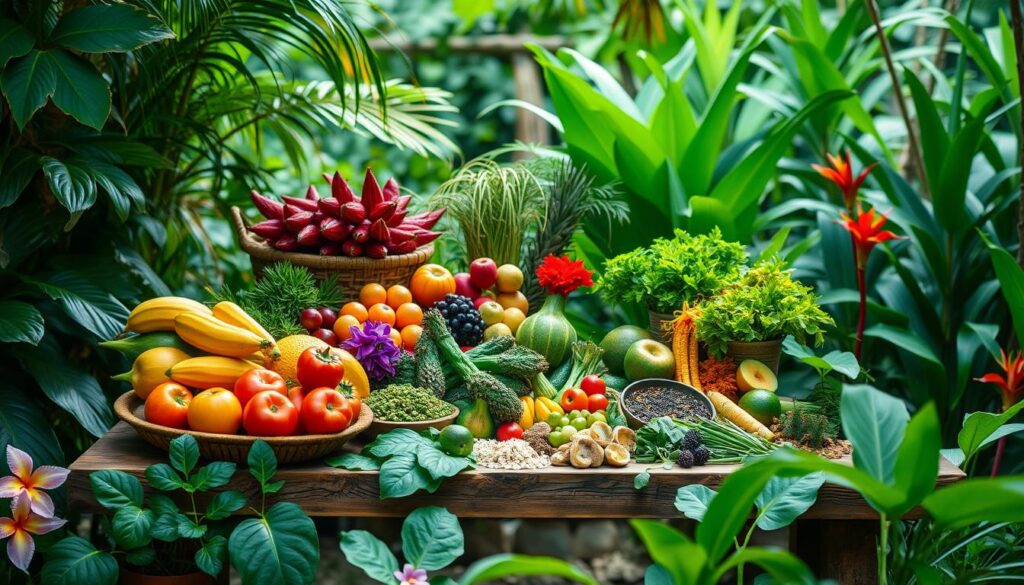
It’s also crucial to think about the dangers of foraging and eating wild. You need to know which plants are toxic, handle food safely, and protect yourself from animals. Being aware of these risks helps you enjoy a safe and healthy diet in the jungle.
Understanding Nutritional Labels in the Wild
Understanding nutritional labels is key for good wilderness nutrition. When I’m in the jungle, I must think about what I eat. This is why outdoor food planning is so important. It helps me find the best food sources in the wild9.
Jungle survival nutrition means being careful about what we eat. We need to know the nutritional value of plants and animals. This way, we can stay healthy and strong in the jungle. A good outdoor food plan is vital for survival9.
Here are some key factors to consider when analyzing food choices in the wild:
- Nutritional value: Look for plants and animals that are rich in nutrients, such as fruits, nuts, and lean proteins.
- Edible plant properties: Be aware of the potential risks and benefits of eating certain plants, including their toxicity and allergenic potential.
- Food preparation: Learn how to prepare and cook food safely in the wild, using techniques such as boiling, roasting, and drying.
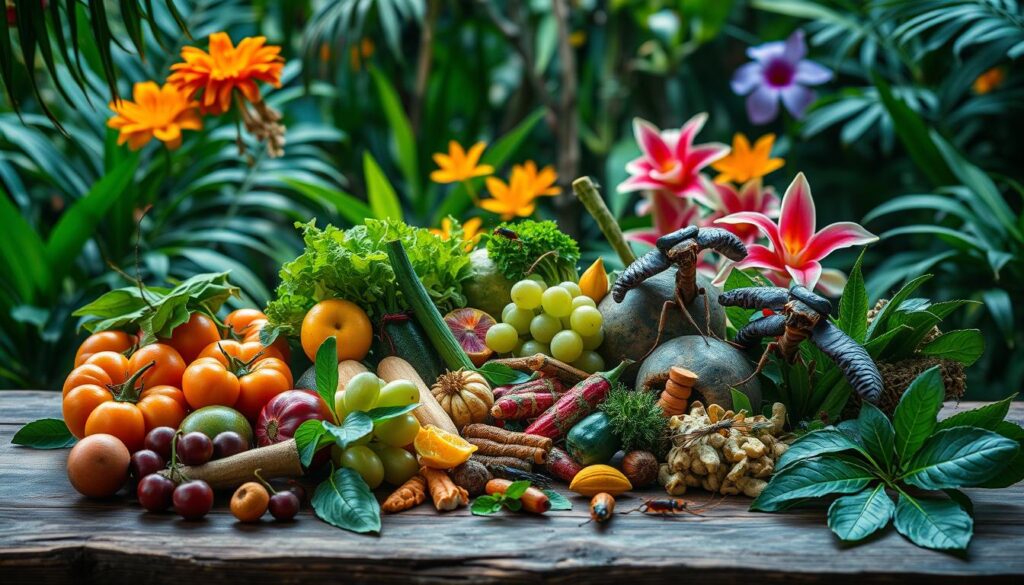
By understanding nutritional labels and making informed decisions about the food we eat, we can stay healthy and energized in the wild. Whether we’re hiking, camping, or surviving in a jungle environment, a well-planned outdoor food planning strategy is essential for our well-being9.
| Food Source | Nutritional Value | Risks and Benefits |
|---|---|---|
| Fruits | Rich in vitamins and minerals | May be high in sugar content |
| Nuts | High in protein and healthy fats | May be allergenic |
| Lean proteins | Rich in protein and low in fat | May be high in mercury content |
Nutritional Myths and Facts in Survival Situations
Many of us follow old survival diet tips without checking if they’re true. It’s crucial to know what’s safe to eat in the wild. Research shows that some common survival nutrition myths can harm our health10.
Understanding the right nutrition for different environments is key. This knowledge helps us choose what to eat and how to find food. By following expert advice, we can boost our survival chances and stay healthy outdoors. For example, knowing which plants are safe to eat is vital10.
Important survival diet tips include drinking plenty of water and finding clean sources. Also, learning to cook safely in the wild and avoiding contamination can prevent sickness. By being mindful of our diet, we can stay healthy in survival situations. Experts say a well-thought-out survival diet is crucial for survival and success in the wild10.
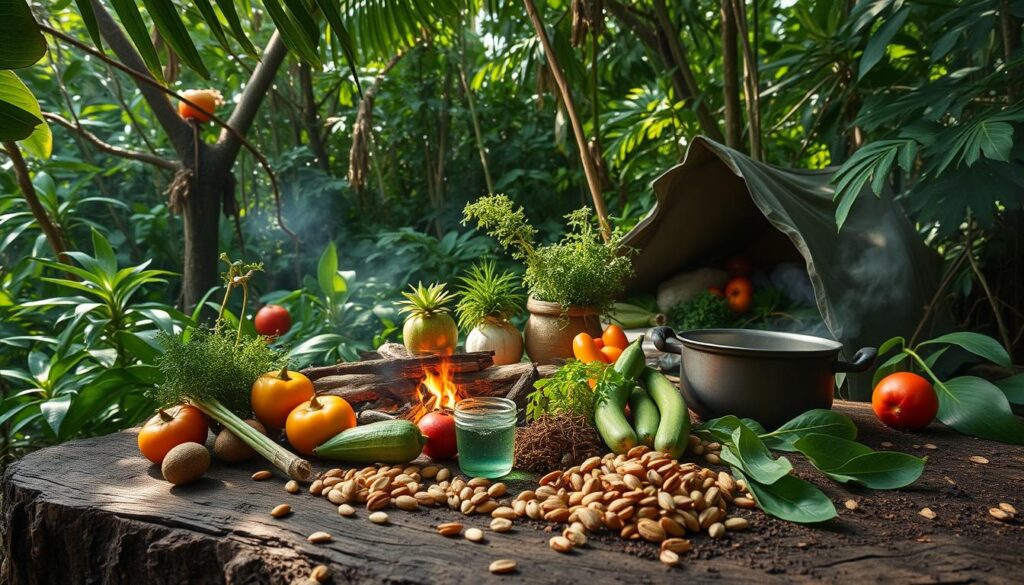
Foraging and eating in the wild need a good understanding of the local environment and food risks. Being aware of these risks and taking precautions can help us avoid getting sick. Research shows that proper nutrition and safe food handling can greatly increase our survival chances10.
Mental Well-being and Nutrition
Exploring wilderness nutrition shows how crucial outdoor food planning is for mental health. It’s not just about eating; it’s about feeding both body and mind for survival. Studies show that a diet full of essential nutrients can improve mood and morale10.
Having a good outdoor food plan can reduce stress and anxiety, common in jungle survival. Foods that support mental health, like omega-3s and complex carbs, help me handle wilderness challenges. Here are some key foods:
- Fatty fish, rich in omega-3 fatty acids
- Nuts and seeds, high in healthy fats and protein
- Whole grains, rich in complex carbohydrates and fiber
By focusing on wilderness nutrition and outdoor food planning, I keep my mental health strong. This increases my survival chances in the jungle. I aim to eat a balanced diet that supports both physical and mental health, key for thriving in the wild10.
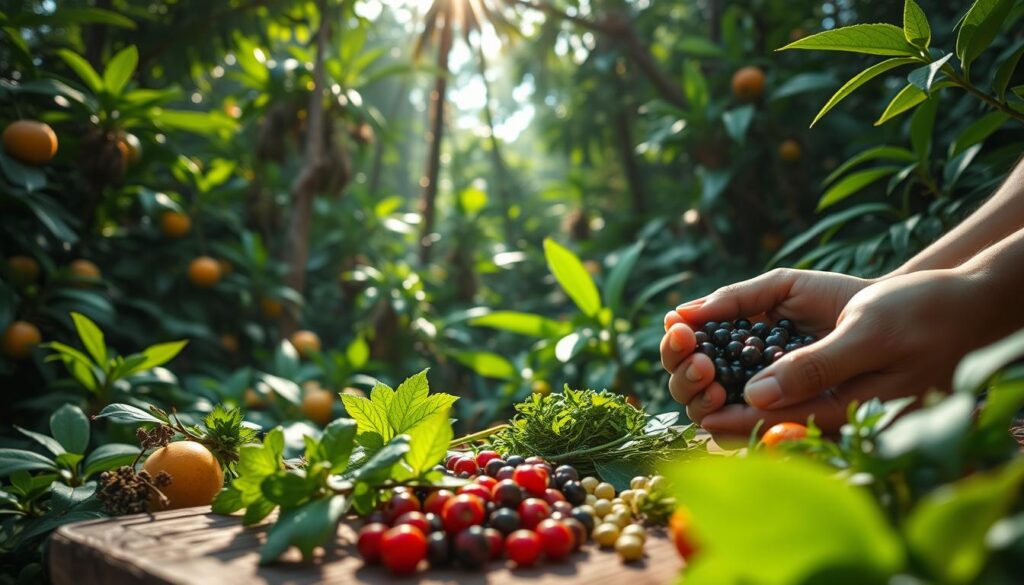
| Foods | Nutritional Benefits |
|---|---|
| Fatty fish | Rich in omega-3 fatty acids, supporting heart health and brain function |
| Nuts and seeds | High in healthy fats and protein, supporting energy and satiety |
| Whole grains | Rich in complex carbohydrates and fiber, supporting digestive health and satisfaction |
Importance of Food Storage and Management
Foraging for food is key, but storing and managing it is just as important. In the wild, planning is crucial to avoid waste and keep food coming. I’ve learned that how you store and manage food can be a matter of life and death.
In the jungle, preserving food is vital. You can use smoking, drying, and fermenting to keep food fresh longer. These methods help you store food for longer, reducing waste and keeping you fed. A study on wilderness food preservation found this to be true.
Techniques for Preserving Food
- Smoking: This method involves exposing food to smoke to dry and preserve it.
- Drying: Removing the moisture from food helps to prevent spoilage and extend its shelf life.
- Fermenting: This process involves allowing food to break down naturally, creating lactic acid that acts as a natural preservative.
By using these survival diet tips and preserving food correctly, you can keep a steady supply of nutritious food. Always remember to keep food safe and clean to avoid getting sick. Proper food storage and management are essential for survival.
Conclusion: Thriving with Jungle Survival Nutrition
As we wrap up our exploration of , it’s clear that good nutrition is key. It’s not just about surviving; it’s about thriving in the wild. By knowing the right nutrients, finding edible plants, and learning to prepare food, you’ll be ready for anything11.
The lessons we’ve covered are useful anywhere, from the Amazon to the Rockies. Remember, your nutrition is as important as your survival skills. They work together8.
I suggest you keep learning about this topic. Look for survival guides and workshops. With the right knowledge, you’ll be ready for anything118.
The path ahead will be tough, but with the right mindset and nutrition, you’ll do great. So, let’s celebrate the adventure that’s coming. May your belly always be full and your spirit strong8.
FAQ
What is the importance of maintaining a healthy and clean diet in the jungle?
Eating right is key to surviving in the jungle. A balanced diet gives you the energy and nutrients you need. It also keeps your mind sharp and healthy.
What are the essential nutrients required for jungle survival?
To survive, you need proteins, carbs, and fats. They give you energy and keep you healthy. They also help keep your mind strong in tough times.
How can I identify and forage for edible plants in the jungle?
Learning to spot safe plants is crucial. This section will guide you on how to find and pick edible plants. It includes tips and pictures to help you.
What are the best protein sources in the jungle, and how can I procure them?
Insects, fish, and small game are great for protein. This section will teach you how to catch and cook these foods. It shows you how to do it in a way that’s good for the jungle.
How can I ensure proper hydration in the jungle?
Drinking enough water is vital. This section will talk about why water is important. It also shows you how to find and purify water safely.
What are the best methods for cooking and preserving food in the wilderness?
Cooking and storing food right is important. This section will teach you how to build a fire and how to smoke, dry, and ferment food. It gives you tips for keeping food safe and tasty in the jungle.
How can I create a sustainable food plan for my jungle survival?
A good food plan is essential for long-term survival. This section will help you make a plan that uses jungle resources wisely. It teaches you how to find, harvest, and manage your food.
How can I avoid common nutritional myths and make informed decisions about what to eat in the jungle?
Knowing the truth about nutrition is important. This section will clear up common myths. It offers advice from survival experts to help you make smart food choices.
What is the connection between diet and mental well-being in the jungle?
What you eat affects your mental health in the jungle. This section will show how food can improve your mood and overall well-being. It’s all about using food to your advantage.
How can I effectively store and manage my food supply in the jungle?
Storing and managing food wisely is key. This section will teach you how to keep food fresh and safe. It shows you how to make your food last longer in the wilderness.
Source Links
- https://www.fajarpengharapan.net/?caller=sermoncollections&url=https://xn--80adkkodkec7fm5ce.xn--p1ai/yslkizwabetleadclubrfe61po – GKPB Fajar Pengharapan
- https://www.animalsaroundtheglobe.com/slow-sloths-4-187107/ – How Slow Are Sloths, Exactly?
- https://www.howtoeatthis.com/safe-bites/is-it-safe-to-eat-maple-leaves/ – Maple Leaves: Edible or Dangerous? A Guide to Safe Tree Foliage Consumption
- https://news.mongabay.com/2025/01/2024s-top-ocean-news-stories-commentary/ – 2024’s top ocean news stories (commentary)
- https://libertadparaestudiar.ucontinental.edu.pe/role-in-the-spotlight/cole-sturgis-life-below-zero-biography.html – The Unseen Life Of Cole Sturgis: Behind The Scenes Of Life Below Zero
- https://www.animalsaroundtheglobe.com/missing-mother-found-inside-16-foot-long-3-221174/ – Missing Mother Found Inside 16-foot-long Python after it Swallowed her Whole in Indonesia
- https://www.americanpartisan.org/2025/01/unprecedented-fires-scorch-3000-acres-in-los-angeles-area-forcing-49000-to-evacuate/ – “Unprecedented Fires” Scorch 3,000 Acres In Los Angeles Area, Forcing 49,000 To Evacuate – American Partisan
- https://residentnews.net/giving-where-you-live/ – Giving Where You Live – Resident News
- https://www.euronews.com/green/2025/01/08/scientists-turn-industrial-waste-into-batteries-that-could-be-used-to-store-renewable-ener – No title found
- https://www.newsday.com/news/health/cancer-patient-classes-rw2orxkw – Exercise and cancer: More doctors recommending physical activity for Long Island patients
- https://q1065.fm/fabric-store-maine-announces-2025-closings/ – Fabric Store With 5 Locations in Maine Announces 2025 Closings
